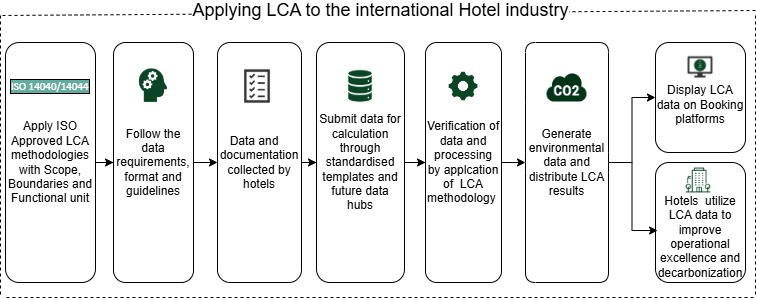The Power of LCA: Navigating the Green Claims Directive in Hospitality


Synopsis
As sustainability continues to dominate the agenda for hospitality leaders worldwide, aligning operations with evolving regulatory frameworks has never been more critical. The EU’s proposed Green Claims Directive represents a bold step towards ensuring transparency and accountability in environmental information used in marketing and on booking platforms, requiring businesses to substantiate their eco-friendly claims with robust evidence.
The directive must be implemented by January 2027. For the hospitality industry, this dovetails with the increasing adoption of Life Cycle Assessment (LCA) methodologies to measure the environmental impact of hotel operations comprehensively, as LCA is the preferred methodology in the Green Claims Directive. This article explores the future role and power of LCA in shaping the industry's path towards authentic, measurable, and impactful practices and how this will help booking platforms, hotels and travelers. The article will exploit the key learnings from ClimateScore as to how LCA is implemented at the hotels and what value this has provided to hotels, guests and buyers as well as a future outlook on how this can drive change and help hotels who engage in LCA stand out in a crowded market.
The booking platforms challenge
The majority of hotel bookings are made through booking platforms, where hotels are compared to support travelers’ purchasing decisions. Under EU law, any environmental information displayed on platforms should be backed by Life Cycle Assessment (LCA), while separate regulations apply to certification schemes. This means hotels and platforms can only present environmental claims if they comply with LCA standards, ensuring comparability and alignment with purchasing intent.
Existing EU regulations enforce these requirements, and in 2024, authorities demonstrated strict enforcement against non-compliance. Simultaneously booking platforms are experiencing growing demand for transparent environmental data and are pushing for LCA metrics to be available for all listed hotels. As a result, hotels will likely soon need to provide their sustainability data to remain competitive.
Are there LCA solutions implemented? Key steps to take
To ensure the credibility and comparability of environmental data to be used for purchase decisions, the hospitality industry should adopt Life Cycle Assessment (LCA) methodologies. For the Green Claims Directive to be meaningful, hotels need a set of shared standards based on similar datasets and data processing tools. To ensure LCA methodologies are developed correctly they must adhere to ISO-14040 and ISO-14044.
These ISO standards clearly state the steps, process and requirements to what must be described in an LCA. This goes from Goal and Scope Definitions, the functional unit and system boundaries, to the life cycle inventory and impact assessment where inputs and outputs are defined and the necessary data quality established. One example of LCA methods implemented in the hotel industry is ClimateScore.
ClimateScore, a Danish scale-up based in Copenhagen, has developed a scalable and global Life Cycle Assessment (LCA) methodology specifically for hotels, which adheres to ISO-14040 and ISO-14044 and has undergone a thorough critical review process by an independent panel of LCA experts, representing leading international LCA institutes, to ensure that scope, data quality, transparency, and comparability meet the highest standards. Since 2019, it has been tested on over 200 hotels from international hotel chains to small family owned hotels worldwide, revealing critical insights into the adoption and implementation of LCA across the sector.
An ISO approved LCA method has gone through the critical step of defining a functional unit, which serves as the basis for measuring and comparing impacts. In hospitality, a logical functional unit is 'one guest night', 'one meal served,' or ‘occupied room’ enabling consistent assessment of energy use, food and beverage consumption, and waste generation across properties. A key feature of ClimateScore’s methodology is its focus on the guest as the functional unit, more precise kg of CO2 per guest. Unlike property-based metrics, which also exist in the industry, ClimateScore evaluates the environmental impact of a single guest’s stay, accounting for different guest types and purposes of visits. This approach not only enables fair comparisons across accommodation types but also provides a simple communicable methodology and framework that supports informed decision-making for leisure travelers, business clients, and procurement professionals alike. At the same time, it provides hotels with valuable insights for operational improvements, balancing scientific rigor with real-world applicability.
The choice of LCA creates opportunities and demands transparency in data and methodology. The same set of data can be utilized for different LCA methodologies and different functional units, as long as it is applied consistently for all hotels being compared. To meet guests and buyers demand for environmental data, high data quality is important. This requires the data to be complete and validated so the guest, hotels and platforms can trust the data quality has been ensured very thoroughly, the ISO-standards ensure this. A schematic overview is shown in Figure 1 below.

Figure 1: Schematic overview of how to implement LCA in the hospitality sector from the first step of establishing an ISO adhering LCA methodology , through data collection, verification and processing to the generation of LCA data to be distributed for both booking platforms and hotels for travelers and decarbonization.
Key learnings and experiences from applying LCA to Hotels
By integrating LCA into operations, hotels and management are empowered to drive value across multiple areas: enhancing branding and marketing, improving employee engagement, increasing operational efficiency to achieve significant cost reductions, identifying targeted initiatives, and achieving tangible reductions in climate impact. All while also meeting the guests’ and buyers’ need for environmental information to choose from. Leadership plays a central role here—industry executives must champion LCA as the standard for credible and actionable sustainability. Regarding the Green Claims Directive, this would mean that hotels who work actively with the LCA and use it as a tool will have significant competitive advantage when the data is integrated into booking platforms to meet the demand for environmental information presented to travelers.
A critical learning involves educating hotel staff. Employees at all levels must understand their roles in influencing the hotel’s environmental footprint and encouraging guests to adopt more sustainable behaviors. From housekeeping to management, aligning teams with sustainability goals creates a culture of accountability and progress.
The final aspect is data collection. ClimateScore's experience shows significant variability in how hotels manage operational data, reflecting different levels of maturity. Data collection often begins with identifying available data, uncovering gaps, and implementing systems to measure key metrics, like weighing food waste or categorizing procurement data. Some hotels rely on manual readings, invoice tracking, or supplier engagement, while more advanced properties use data management systems to extract and analyze data seamlessly. Hotels found that once they identified their data sources, gaps, and responsible staff, data collection and verification took only a few hours.
The experience shows that hotels are eager to advance their sustainability efforts but often lack the guidance needed to create lasting value, communicate their initiatives effectively—both internally and externally—and manage sustainability data.
Another experience was that adopting an LCA with a guest-centric perspective unlocked greater opportunities for reducing impacts compared to focusing on property-related emissions. The metric was easily understandable, a need which is well documented for eco-conscious travelers. By leveraging the scientific rigor of an LCA method, hotels gain access to actionable insights and countless key performance indicators (KPIs) from consistent data sources allowing them to take confident action and communicate their results with trust and credibility, free from uncertainty and fear of greenwashing. Read a hotel case on ClimateScore LCA here.
To address these challenges and reach the full potential of LCA, the industry needs stronger industry leadership to provide guidance on data collection and management and increase LCA capabilities. Establishing clear frameworks or knowledge centers will help hotels at all levels of data maturity document, analyze, and act on their sustainability metrics effectively.
ClimateScore’s work underscores that while hotels are at varying stages of readiness, adopting a systematic approach to LCA is a crucial step toward achieving meaningful and measurable environmental progress.
What the Future Enables with LCA
Legislation, such as the EU’s Green Claims Directive, alongside existing marketing regulations, has set the stage for widespread adoption of LCA. The industry needs LCA, and hotels and travelers need LCA. However, this transformation requires the sector collaborates to implement and evolve the use of LCA in the industry. By embracing a unified, data-driven approach and applying the same thorough metrics year after year, the hospitality industry can achieve long term value—not only by advancing sustainability goals but also as a strategic means to enhance operational efficiency, guest satisfaction, and long-term profitability.
If the industry takes a collective leap forward, there is strong reason to believe that hotels will embrace this change. Hotels are not unwilling; rather, they are often overwhelmed by the scale of the challenge and lack the expertise or resources to drive systemic change independently. Achieving meaningful progress requires a unified purpose, clear measurement standards, and guidance that empowers all stakeholders.
Furthermore, the vast quantities of CO₂ data generated through LCA and large-scale data collection will enable the development of centralized data hubs and monitoring systems. These tools will ensure continuous improvement across the industry, facilitating transparency, benchmarking, and measurable progress toward global sustainability goals. The industry’s path forward is clear: those who invest in credible, science-based sustainability reporting today will lead the market tomorrow.